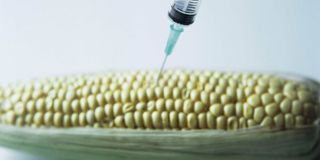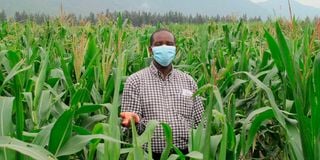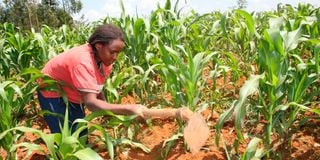The GMO debate: Science, politics, myths and facts

An abstract depiction of genetic engineering of maize.
What you need to know:
- The lifting of the ban on importation and growth of genetically modified (GM) crops in October by the government has set in motion an intense debate, with Kenyans are divided.
- In this discourse, though, objectivity has often been drowned in political rhetoric, myths, fear, absurdities, conspiracy theories and outright lies.
- The result is a heated exchange that seems to be heading nowhere, even though many Kenyans know about biotechnology, or have at least have heard about GMOs.
Some Kenyans believe they would get cancer and die if they ate foods made from genetically modified organisms (GMOs). Others argue bioengineered foods are not only harmless, but healthy, too.
Then there is what the politicians are saying now and what they have said before. Which, in Kenya, mostly depends on the season and their circumstances.
The lifting of the ban on importation and growth of genetically modified (GM) crops in October by the government has set in motion an intense debate, with Kenyans are divided.
In this discourse, though, objectivity has often been drowned in political rhetoric, myths, fear, absurdities, conspiracy theories and outright lies.
The result is a heated exchange that seems to be heading nowhere, even though many Kenyans know about biotechnology, or have at least have heard about GMOs. More than 60 per cent of Kenyans say there is lack of sufficient information about this technology, according to findings of a survey done by GeoPoll in October last year.
For more than 50 years, the world has used genetic engineering to boost yields in food crops and to develop medicine (such as insulin for treating diabetes).
Coming at a time when Kenya is experiencing the worst climate-induced drought in 40 years, putting food security in further jeopardy, the government is willing to go the biotech route to feed Kenyans.
But what is biotech? Why is it important in agriculture?
Dr Florence Wambugu, a veteran biotechnologist and chief executive of Africa Harvest, explains that biotech is a methodology and tool that uses life to derive certain qualities in organisms.
“It is similar to technologies such as tissue culture that help farmers to get higher yields in bananas,” she adds.
Biotech alters organisms, or their parts, to develop those with more desirable traits such as faster maturity or higher tolerance to pests or drought. Using bacillus thuringiensis bacteria to control stem borer in maize is one example of biotech. The controversial technology is in application all over the world.
“The bacteria cannot affect human beings because, unlike maize, our bodies do not have receptors to host it,” Dr Wambugu assures.

Prof Theophilus Mutui checks on Bt Maize which is under the National Performance Trials at Kalro, Kibos in Kisumu County.
Science and politics, though, tend to clash. In 2012, the government hastily banned GM crops in Kenya. A damning report had indicated that GM food crops are harmful to human health and could be carcinogenic.
Now, the ban has been withdrawn, opening the country’s borders to GM food crops and, effectively, the raging debate on their pros and cons.
So, how did the ban come into being?
It started with a study by French molecular biologist Gilles-Éric Séralini that concluded that genetically modified food is unsafe for humans and could cause cancer.
Séralini had fed rats on GM corn from Monsanto and studied them for two years and found them to have cancer tumours while others suffered multiple organ failure. These findings were published in the journal Food and Chemical Toxicology in 2012.
The ripple effect was instant and widespread as governments around the world frantically assessed the implications.
By the time the matter arrived in the National Assembly for debate, battle lines had already been drawn. After a charged debate, the House voted in favour of banning GM crops in Kenya.
In November 2012, then Minister for Health Beth Mugo gazetted the ban. For a decade, Kenya did not import, grow or consume genetically modified food crops.
A year later, in 2013, hundreds of scientists criticised Séralini’s paper as members of the academia called his findings flawed, biased and inconclusive. The paper was later retracted.
But by the time of its withdrawal, many countries in the world had either suspended trade in or banned GMOs altogether.
Guesswork
Dr John Mutunga, the chair of the National Assembly’s Committee on Agriculture, says there is no guesswork in science.
“There are three principles in science. Reliability, verifiability and validity. Findings of every research must meet these elements,” says Dr Mutunga.
He says it is tragic for a nation to discuss scientific matters without sufficient grounding. His background is in agriculture and environmental studies.
“When people dwell on emotions and assumptions, they end up oversimplifying complex issues,” he says.
At the height of the GMO debate in October last year, opposition leaders Raila Odinga and Kalonzo Musyoka warned that GM foods were dangerous for Kenya.
Said Mr Musyoka: “We [will] place the lives and livelihoods of our people at very serious [health] risks by admitting [GMO] into Kenya.”
The Wiper leader also claimed that Kenya lacks adequate capacity to test GMO traits and the impact on human health.
In Kenya and in the world, the risk to health is one of the major sticking points on the consumption of GM food crops.
But do GM foods really cause cancer? Is there a direct link between them and cancer infection?
Dr Alfred Karagu, the CEO of the National Cancer Institute, argues that there is no evidence to that effect.
“We do not have a lot of clinical data on the relationship between GM foods and the risk of cancer. Most of the studies done so far have [involved animals]. We do not have a lot of human studies that have assessed this,” he says.
Dr Karagu, however, observes that science and evidence could change over time as more research on the relationship is conducted.

A farmer weeds her maize crop at Yamumbi in Eldoret. Experts say yields from genetically modified crops are higher and cheaper to grow. Some people are opposed to the importation of GM maize saying it is not fit for consumption
“These food [crops] have been shown to require greater use of certain herbicides, especially those with glyphosate whose consumption over time [causes] gastrointestinal disorders such as cancers of the liver, thyroids and myeloma,” he adds. This will be of concern to researchers and medics, he says. “We need to develop longitudinal data on the likelihood of such sustained exposure leading to cancer.”
The National Cancer Institute says it is engaging different stakeholders such as the National Biosafety Authority (NBA) and research agencies to develop surveillance and tracking mechanisms to identify and document evidence related to of GM foods.
“In case there are harmful effects that are emerging, we are able to quickly detect them and advise all stakeholders on what needs to be done,” says Dr Karagu.
He notes that consumers have the right to know that the food they are buying is either GM or naturally developed, through labelling. “They have to be fully aware of what use of such foods means.”
Does Kenya have the infrastructure for regulation?
In 2009, Parliament enacted the Biosafety Act, establishing the NBA. The agency is mandated to supervise and control the transfer, handling and use of GM crops to ensure human safety, animal health and environmental protection.
Genetic engineering in Kenya had begun much earlier, though. In 2005, then Minister for Education Prof George Saitoti opened the Level II biosafety laboratory at Kenyatta University.
“For 17 years, our university has been conducting research on food crops such as groundnuts, maize, sorghum and cassava,” says Prof Richard Oduor, a biotech researcher at Kenyatta University. He is the registrar in charge of research, innovation and outreach at the institution.
Other institutions accredited by NBA are Kenya Agricultural and Livestock Research Organisation (Kalro), International Livestock Research Institute and Masinde Muliro University of Science and Technology.
Prof Oduor says Kenya ranks highly in the region in biotech research.
“We have a regulatory agency, labs, researchers and goodwill by the government. Kenya has trained for Tanzania, Ethiopia, Sudan, West Africa and even South Africa. So we are a serious hub,” he adds.
For 13 years, NBA has approved tests for GM food crop species at different levels, from lab to confined field trials and limited open cultivation. Food crops such as sorghum, maize, cassava, potatoes and banana and BT cotton have already advanced to the confined field trial and environmental release stage. BT cotton has been commercialised while BT maize has been approved for national performance trials. Last year, NBA approved Kalro’s application to test bioengineered potato varieties for late blight resistance in Kenya.
Approval for growth is issued upon a “thorough risk assessment”’ by NBA.
Roy Mugiira, the CEO of NBA, reveals that as soon as the ban was effected in 2012, a taskforce was set up to assess Kenya’s capacity to regulate GMOs in the future.
The taskforce was to review the country’s regulatory framework, the availability and suitability of labs and clinical and subclinical trials of GMOs for safety.
‘‘Every year, we presented reports on our level of preparedness to Cabinet. In 2019, the government was satisfied with the measures we had put in place and approved cultivation of BT cotton. We then embarked on working towards approval of BT maize,’’ Mugiira recounts.
He adds on the lifting of the ban: ‘‘Kenya has what it takes to regulate GMOs. Kenyans should have confidence in our institutions and our professionals.’’
Meanwhile, the government has been facilitating researchers to study and test GMOs in the country through the National Research Fund. All universities offering biotechnology courses are members of the Kenya University Biotechnology Consortium that advocates safe application of biotechnology. Prof Oduor is the chairperson.
When the ban was effected 10 years ago, NBA was only two years old. Prof Oduor says the agency has developed its capacity over the years, making it better equipped to handle biosafety issues.
Another divisive issue is whether GM crops actually perform better than other varieties. Farmers says they do.
With more than 500 acres under mixed farming in Endebess in Trans Nzoia County, William Koros is a model farmer. He grows maize, tomatoes, cabbage and other vegetables, all using improved seed varieties. He also practices dairy.
“I harvested 50 bags per acre last year. Sometimes I get 40 bags per acre, which is not bad,” he explains.
In this maize farming region, some farmers still grow the traditional varieties of maize. “Most produce as low as three bags from an acre,” he says.
Now in his 25th year of farming, Koros says it is out of ignorance that some people are opposed to biotechnology.
Barnabas Nyapara, a cotton farmer from Busia County, agrees. After farming cotton for 50 years, he says there is a stark difference between the old variety of cotton and its improved version.
“BT cotton produces more balls. I am a farmer and I am doing this for money,” he says proudly, adding that he got the seeds after being selected by a research company. Since last year, Nyapara is withdrawing the KAS81M variety that he has grown for more than 50 years in favour of BT cotton.
For many years, farmers in Busia County, a rich cotton growing belt, had abandoned the crop in favour of maize, millet and sorghum owing to higher production cost. Many are now reintroducing the cash crop.
The only setback, Nyapara notes, is the availability of seeds of the higher yielding variety. “Everyone here now wants to grow BT cotton.”
Some of the critics of the lifting of the ban on GMOs say the country can navigate its food security concerns without them. Trans Nzoia Governor George Natembeya is one such critic.
“The government is taking a shortcut. They say these foods are cheaper, but they come with serious health consequences. The government will spend more money treating the population,’’ says the governor. To him, empowering farmers is the solution.
“If we fixed the soils and guaranteed minimum returns for their produce, they would produce maize. Kenya has a lot of arable land. We have a good climate with rainfall throughout the year. We can produce sufficient food to feed our people. We could grow two crops in a year, but we are currently doing only one,” he observes.
Dr Wambugu says this is only half true.
“If you empower farmers but let them use the wrong seeds, those that are susceptible to diseases and pests, they will not make any profit out of it. Investment in quality seeds and fertiliser and other components is critical,” she argues.
Prof Oduor says South Africa, Eswatini, Malawi and Tanzania that have adopted biotech in their food agriculture are more food secure, as are Ethiopia, Egypt and Burkina Faso. In Nigeria and Burkina Faso, cotton, cowpeas and maize have been commercialised. In 2009, the Food and Agriculture Organization of the United Nations said the world will need to increase food production by 70 per cent to cater for the 9.8 billion people on the planet by 2050.
In the science world, the consensus is that biotech is the solution. Proponents of biotech cite the “green revolution” in Malaysia, India and Indonesia in the 1960s and 70s as a case for GM foods in Kenya. Through the revolution, the previous importers of food were able to grow enough rice and wheat for their populations and to export millions of tonnes, thanks to biotech.
India introduced high yield variety and resistant seeds of wheat – alongside mechanisation, irrigation and use of pesticides and fertilisers – which produced enough food grain and defeated the wheat rust menace in the process.
“We cannot demonise GMO when the world over, there is no non-GM insulin. Why is it an issue when we are talking about GM in terms of food?’’ Prof Oduor asks.
He adds: “We are not pioneers of GM products because it is a 40-year-old technology. We are lucky as a country because we can learn from mistakes that could have been there.”
Despite all these concerns on safety, it is control of patents and ownership of seed development technology that has been the touchiest topic the world over. In Kenya, some farmers are apprehensive that seed multinationals would control access to seeds.
Consequently, organisations such as Seed Savers Network have emerged, working with communities to help them “strengthen their seed systems for improved seed access”, essentially, to preserve indigenous seed varieties.
“Seed companies want to tell us what to eat, what to grow and how to grow it,” warns Daniel Wanjama, the coordinator of Seed Savers Network. He says multinationals are after selling what is “good for business” rather than what is “good for nutrition” .
But Dr Wambugu says these are “mere technicalities” that can be addressed. ‘‘They are trade issues that can be negotiated on a different platform through the World Trade Organisation,” she says.
Some GM opponents say biotech leads to loss of indigenous seed varieties. But Prof Oduor says “indigenous seeds” is a fallacy, noting that all crops have undergone several evolutions.
There are, however, risks for holding on to indigenous seeds, as Prof Oduor warns: “The environment is changing. Climate is changing. Pests are becoming more virulent. Diseases are getting tougher. We must apply technology that addresses all these challenges.”
Is it possible to preserve these seeds, though? The researcher thinks it is. “The best way is to bring them to the lab, extract their DNA and keep them for a longer time because DNA does not die.”
Experts assure that having GM technology does not take away farmers’ liberty to keep their seeds for safety or other reasons.
“They can adopt biotech and still grow the crops they like,” says Dr Wambugu.
For Seed Savers Network, GM food forms might also complicate Kenya’s export capacity.
“Most European countries that Kenya trades with do not admit GM food imports. Growing them here would make it harder for us to export to them because of higher compliance levels,” Wanjama says.
Potential contamination of native crop varieties by GM forms is many a farmers’ dread. Today, the US is embroiled in a tense trade tussle with Mexico after the country banned GM corn from their northern neighbours, citing contamination fears.
Scientists recommend zoning, where farmers demarcate areas as GM or non-GM in their locales to prevent contamination through pollination. Spacing crop varieties by as few as 10 days has also been fronted as a solution.
But those opposed to GM foods locally say this is easier said than done, considering Kenya’s land ownership system.





